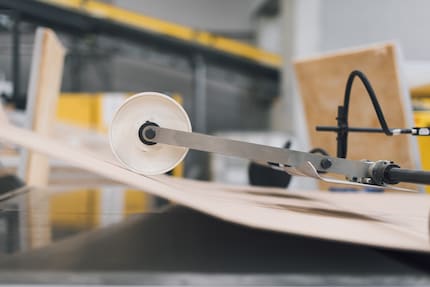
Company news
Our carbon crash diet: time to shed half the weight
by Tobias Billeter

In 2022, Digitec Galaxus succeeded yet again in improving its resource efficiency. We even managed to beat our annual reduction targets for packaging, energy and transportation. Although company growth saw emissions increase compared to the previous year, we won’t be curtailing our ambitions.
We, too, were curious to find out how our carbon footprint would develop over the first post-pandemic year. Many colleagues returned to the office, and seamless travel into and out of the country resumed. Not only that, but Digitec Galaxus increased sales by 8.7 per cent in 2022 compared to 2021, delivering almost 20 per cent more parcels to customers. We were well aware that this growth would raise greenhouse gas emissions. However, the fact we managed to stick to our defined pathway towards halving our climate footprint by 2030 gives us grounds for optimism. Even so, achieving further efficiency gains is likely to become increasingly challenging.
Let’s start with the first goal – packaging. Over the past three years, we’ve managed to reduce the emissions level per item shipped from our warehouses by 21 per cent. As a result, we’ve smashed our pre-defined reduction target of three per cent per year. Various factors have contributed to this greenhouse gas reduction, the first being our new packaging machines. Thanks to cutting-edge technology, the packaging of machine-wrapped parcels can now be customised, rendering filler materials largely unnecessary. We’ve also optimised our standard parcel sizes, reducing the cardboard volume per parcel) and saving a large quantity of filler material. Thirdly, we’ve declared war on repackaging. Wherever possible, robustly packaged individual products such as printers and vacuum cleaners are delivered to our customers in their original box. This, too, has helped us save on cardboard and filler material.

We achieved our goal of purchasing exclusively renewable electricity by 2040 way back in 2021. There are a couple of things to bear in mind here in the interests of transparency. For some externally leased sites, we haven’t yet managed to secure a green power option from the local energy supplier. In some cases, this is down to long-term contracts, in others, it’s because there are none available. When this happens, separately purchased guarantees of origin ensure that the electricity has come from a renewable source.
The mild winter was a boon for us when it came to heat generation. Our greenhouse gas emissions generated by oil and gas heating systems fell by 20 per cent compared to the previous year. Compare the figure with that of 2019, and the decrease rises to 30.2 per cent. This is despite the fact we increased both our warehouse and office space by a quarter compared to 2021, and by a half compared to 2019.
After the Covid-19 restrictions were lifted, we expected to see business travel and commuting spike in 2022. However, if we compare business-related travel emissions in 2022 with the reference year 2019, Galaxus has already significantly exceeded our reduction target of 30 per cent per employee by 2025. Our teams in Hamburg and Belgrade have grown considerably, and we’ve strengthened international collaboration. Although video calls haven’t completely replaced face-to-face meetings, virtual gatherings save a lot of time and money, and have undoubtedly led to a decrease in business travel. From this point of view, video calls are definitely a boon for the climate.

A similar picture emerges for commuter traffic. Although our employees racked up significantly more passenger kilometres in 2022, we did almost double our workforce in relation to the reference year 2019. Greenhouse gas emissions per head generated by commuting, however, have fallen by 37 per cent over the last three years. At least for the time being, the 5-day office week seems to be a thing of the past. The good news is that working from home more frequently means fewer commuting kilometres and fewer greenhouse gas emissions.
Our business in Switzerland and elsewhere is developing nicely, and we hope that’ll remain the case. At the same time, our growth has driven up our warehouse space, workforce numbers and parcel volumes year on year – and our climate footprint alongside them. Continuously building up our logistics capacities and having to reckon with adjusted calculation bases makes it difficult to draw comparisons with the 2019 reference year. This is because the absolute emission figures don’t reflect the savings and efficiency gains we achieve on an ongoing basis. But this has no bearing on our ambitions. If we calculate the greenhouse gas emissions per parcel shipped, it’s clear we’ve been achieving the targets we’ve set.
There’s no doubt that we’re facing enormous challenges. We’ve committed to halving company greenhouse gas emissions by 2030, and reaching net zero by 2050. We need ongoing projects if we’re to stick to the pathway we’ve defined to reduce emissions over the coming years. We’ll keep you posted on our efforts.
Making sure employees and media know what's up at Digitec Galaxus is my job. But without fresh air and a lot of exercise, I basically stop functioning. The great outdoors provides me with the energy I need to stay on the ball. Jazz gives me the tranquility to tame my kids.
Everything you'd usually read on a news portal or in the newspaper can be found here, directly from the source: annual figures, new services, our efforts for greater sustainability, sales trends and so on.
Show all